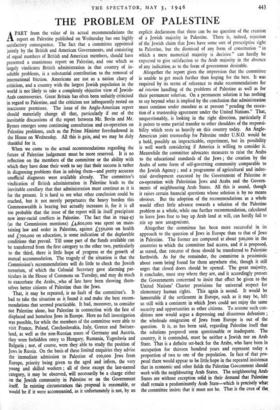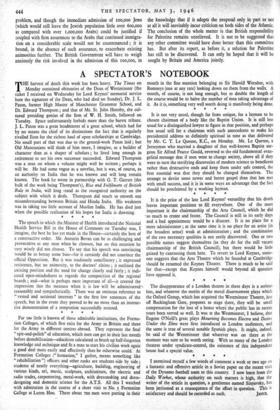THE PROBLEM OF PALESTINE
APART from the value of its actual recommendations the report on Palestine published on Wednesday has one highly satisfactory consequence. The fact that a committee appointed jointly by the British and American Governments, and consisting of equal numbers of British and American members, should have presented a unanimous report on Palestine, and one which so largely vindicates British administration in that country of in- soluble problems, is a substantial contribution to the removal of international friction. Americans are not as a nation chary of criticism, and a country with the largest Jewish population in the world is not likely to take a completely objective view of Jewish- Arab controversies. Great Britain has often been unfairly criticised in regard to Palestine, and the criticism not infrequently rested on inaccurate premisses. The issue of the Anglo-American report should materially change all that, particularly if out of the inevitable discussions of the report between Mr. Bevin and Mr. Byrnes emerges some continuing consultation and co-operation on Palestine problems, such as the Prime Minister foreshadowed in the House on Wednesday. All this is gain, and we may be duly thankful for it.
When we come to the actual recommendations regarding the future of Palestine judgement must be more reserved. It is no reflection on the members of the committee or the ability with which they have done their work to say that their success is rather in diagnosing problems than in solving them—and pretty accurate unofficial diagnoses were available already. The committee's vindication of British administration in Palestine leads to the inevitable corollary that that administration must continue as it is for the present. It is hard to see what other conclusion could be reached, but it not merely perpetuates the heavy burden this Commonwealth is bearing but actually increases it, for it is all too probable that the issue of the report will in itself precipitate new inter-racial conflicts in Palestine. The fact that in 1944-45 (as the Commission mentions) £4,600,000 was spent on main- taining law and order in Palestine, against £550,000 on health and £700,000 on education, is some indication of the deplorable conditions that prevail. Till some part of the'funds available can be transferred from the first category to the other two, particularly to the third, there is little hope of progress or the growth of mutual accommodation. The tragedy of the situation is that the Commission's recommendations will do little to check the Jewish terrorism, of which the Colonial Secretary gave alarming par- ticulars in the House of Commons on Tuesday, and may do much to exacerbate the Arabs, who of Tate have been showing them- selves better citizens of Palestine than the Jews.
That, it may be repeated, is no fault of the committee's. It had to take the situation as it found it and make the best recom- mendations that seemed practicable. It had, moreover, to consider not Palestine alone, but Palestine in connection with the fate of displaced and homeless Jews in Europe. Here no full investigation was possible, for while the members of the committee were able to visit France, Poland, Czechoslovakia, Italy, Greece and Switzer- land, as well as the non-Russian zones of Germany and Austria, they were forbidden entry to Hungary, Rumania, Yugoslavia and Bulgaria ; nor, of course, were they able to study the position of Jews in Russia. On the basis of these limited enquiries they advise the immediate admission to Palestine of roo,000 Jews from Europe, priority being given to the aged and infirm, the very young and skilled workers ; all of these except the last-named category, it may be observed, will necessarily be a charge either on the Jewish community in Palestine or on the Government itself. In existing circumstances this proposal is reasonable, or would be if it were accompanied, as it unfortunately is not, by an explicit declaration that there can be no question of the creation of a Jewish majority in Palestine. There is, indeed, rejection of the Jewish claim that Jews have some sort of prescriptive right to Palestine, but the dismissal of any form of constitution " in which a mere numerical majority is decisive " can hardly be expected to give satisfaction to the Arab majority in the absence of any indication, as to the form of government desirable.
Altogether the report gives the impression that the committee is unable to get much further than hoping for the best. It was required by its terms of reference to make recommendations for ad interim handling of the problems of Palestine as well as for their permanent solution. On a permanent solution it has nothing to say beyond what is implied by the conclusion that administration must continue under mandate as at present " pending the execu- tion of a trusteeship agreement under the United Nations." That, unquestionably, is looking in the right direction, particularly if it points to some partial transfer to other shoulders of the responsi- bility which rests so heavily on this country today. An Anglo- American joint trusteeship for Palestine under U.N.O. would be a bold, possibly an impracticable, experiment, but its possibility is well worth considering if America is willing to consider it. Meanwhile the committee advocates measures to raise the Arabs to the educational standards of the Jews ; the creation by the Arabs of some form of self-governing community comparable to the Jewish Agency ; and a programme of agricultural and indus- trial development executed by the Government of Palestine in co-operation with Palestinian Jews and Arabs and the Govern- ments of neighbouring Arab States. All this is sound, though it raises certain financial questions whose solution is by no means obvious. But the adoption of the recommendations as a whole would effect little advance towards a solution of the Palestine problem as a whole, while one further recommendation, calculated to leave Jews free to buy up Arab land at will, can hardly fail to stir up new antagonisms.
Altogether the- committee has been more successful in its approach to the question of Jews in Europe than to that of Jews in Palestine. The former are computed at about 500,000 in the countries to which the committee had access, and it is proposed, as stated, that Ioo,000 of these should be transferred to Palestine forthwith. As for the remainder, the committee is pessimistic about room being found for them anywhere else, though it still urges that closed doors should be opened. The great majority, it concludes, must stay where they are, and it accordingly presses the Governments concerned to insist that effect be given to the United Nations' Charter provisions for universal respect for elementary human rights. This again is sound. It would be lamentable if the settlement in Europe, such as it may be, left us still with a continent in which Jews could not enjoy the same security and opportunities as other citizens. To assume such con- ditions now would argue a depressing and disastrous defeatism ; the wholesale emigration of Jews from Europe is out of the question. It is, as has been said, regarding Palestine itself that the solutions proposed seem questionable or inadequate. The country, it is contended, must be neither a Jewish nor an Arab State. That is a definite set-back for the Arabs, who have been in occupation for thirteen hundred years and represent today a proportion of two to one of the population. In face of that pro- posal there would appear to be little hope in the repeated insistence that in economic and other fields the Palestine Government should work with the neighbouring Arab States. The neighbouring Arab States are without exception solid in their demand that Palestine shall remain a predominantly Arab State—which is precisely what the committee insists that it must not be. That is the crux of the problem, and though the immediate admission of too,000 Jews (which would still leave the Jewish population little over 600,000 as compared with over t,000,000 Arabs) could be justified if coupled with firm assurances to the Arabs that continued immigra- tion on a considerable scale would not be countenanced ; it is bound, in the absence of such assurance, to exacerbate existing animosities further. The British Government will have to weigh anxiously the risk involved in the admission of this ioo,000, in the knowledge that if it adopts the proposal only in part or not at all it will inevitably incur criticism on both sides of the Atlantic. The conclusion of the whole matter is that British responsibility for Palestine remains unrelieved. It is not to be suggested that any other committee would have done better than this committee has. But after its report, as before it, a solution for Palestine has still to be discovered. It can only be hoped that it will be sought by Britain and America jointly.































 Previous page
Previous page